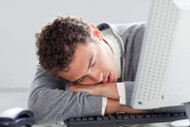How Much Sleep Do We Really Need?
Apr 21st 2021
Posted by Stephanie Chambers
by Stephanie Chambers
Recently, I was watching a wonderful show on TV “How We Got To Now” by Steven Johnson about time and he went on board a submarine. The people on this submarine had no concept of time because they were underwater and, thus, couldn’t see the sun. They said because they were short on staff, they had altered their clocks so they would only get 6 hours sleep and then be back on duty for work. I was horrified. Six hours sleep isn’t enough – not on a regular basis. I remember making a mental note to stay away from the oceans where some half-asleep submarine pilot could bump his huge submarine into me.
But how much sleep do people need? Often I hear people saying they only need six hours sleep, but generally they have a strong cup of coffee in hand. Are they just deluding themselves? According to the National Sleep Foundation 1 and based on research, adults need anywhere from 7 to 9 hours of sleep. Older adults (65 and above), need 7 to 8 hours. Children need a lot more.
And are there really night people? Often you hear people saying the reason they get to bed late is because they are “night people.” Is that true? Well, according to research, our bodies do keep track of time. Just like fruit flies, which hatch at the same time of day 2, our bodies keep track of time and are used to routine (maybe because in the old days we had to go to bed when it was dark).
There has been some speculation 3 (based on research) that our enzymes are also designed to switch on at certain times of day. That means when eating after dark, there may not be sufficient enzymes on board to deal with the food eaten at that time. Possibly, this is why a lot of people these days are often overweight and suffering from illnesses such as diabetes.
Ayurveda says that the influence of the doshas is different depending on the time of day. After 10 p.m. at night, Pitta dosha increases and that is why people find it harder to go to bed if they stay up this late. Instead, their hunger increases – hence the midnight snack.
It has only been in the last century that people eat their larger meal at night. In the old days, the large meal was eaten in the middle of the day. The irony is that modern people tend to eat sandwiches for lunch and yet they were invented by the English as a light snack to have at night (because they ate their real feast at lunchtime).
SO IF YOU WANT TO GET BACK ON TRACK AND MORE IN TUNE WITH YOUR BODY’S NATURAL RHYTHM, WHAT CAN YOU DO?
Gradually reducing the number of stimulants you consume (i.e. coffee, tea, chocolate and pop) and having them only very early in the day may help. Eating at least two hours or more before bedtime can help (according to Ayurveda, it is best to finish eating by 7:30 p.m.). Switching off the TV and electronics and listening to soft music or reading relaxing uplifting books for at least half an hour before bed may help you to settle down. See our page Essential Oils For Sleep & Insomnia for more tips.
Many find essential oils useful. At Amrita, we have developed a combination of the best essential oils for sleep into a blend called Deep Rest Roll-On Relief which you can have at your bedside. It contains Red Mandarine, Lavender Extra, Sweet Marjoram and Mandarine Petitgrain and other therapeutic ingredients. It is also available as a Deep Rest Synergy blend. Some like to just sprinkle some lavender on their pillow before bed.
So I hope you find these tips useful and manage to get more than six hours sleep from now on. Wishing you sweet dreams!
Sources:
1 https://sleepfoundation.org/how-sleep-works/how-much-sleep-do-we-really-need/page/0/1
2 http://publications.nigms.nih.gov/insidelifescience/resetting-our-clocks.html
3 http://www.the-scientist.com/?articles.view/articleNo/37269/title/Out-of-Sync/
Disclaimer: The statements made in this blog have not been evaluated by the U.S. Food and Drug Administration (FDA). They are not intended to diagnose, cure or prevent any disease. If a condition persists, please contact your physician or healthcare provider. The information provided is not a substitute for a face-to-face consultation with a healthcare provider, and should not be construed as medical advice.
Original Published: 2016-06-22 / Last Modified: 2021-10-11

